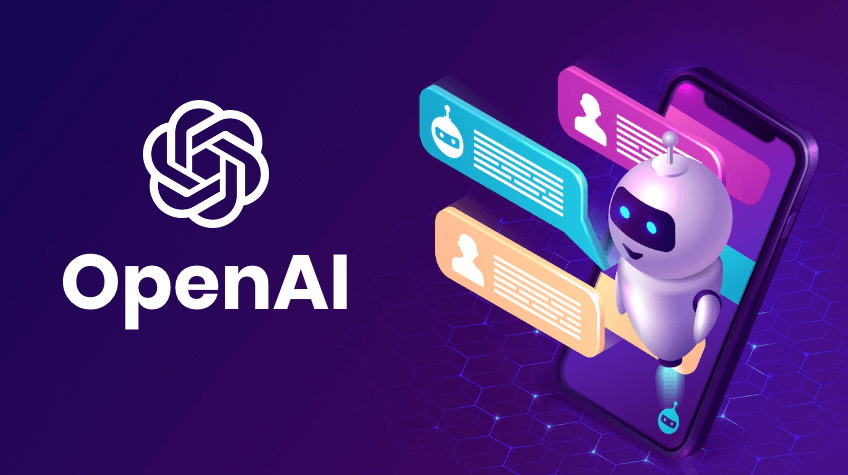By Abass Alzanjne, AI Researcher
ChatGPT is the bright future that will accelerate the 5th industrial revolution and strengthen the connection between man and machine!
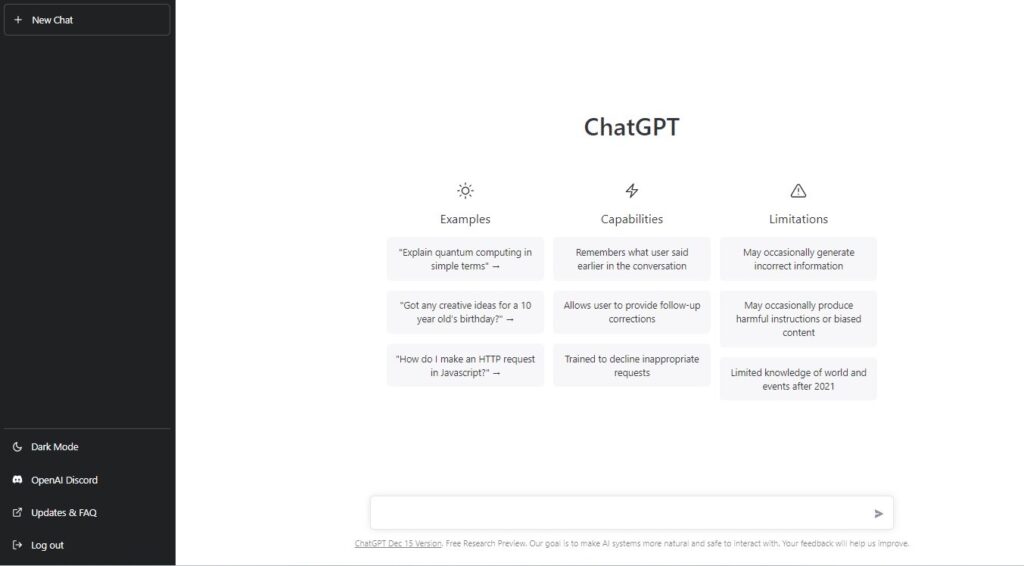
Washington D.C. AI technology is changing human life in many ways, and the impact of this technology is likely to grow in the coming years. Some of the ways in which AI is currently changing human life include improving decision-making and problem-solving abilities, automating routine tasks, enabling the development of new products and services. In the future, AI is likely to play an even larger role in many areas of human life, such as healthcare, transportation, and finance. It is also possible that AI will be used to create new forms of entertainment, to help us understand and navigate the world around us in more effective ways.
ChatGPT a new frontrunner AI application presented, as part of the Artificial Intelligence Journalism for Research and Forecasting’s (AIJRF) periodic series of research on new AI application developments. There have been over one million subscribers in no time, making this app the topic of every news channel and social media post around the clock.
The ChatGPT program is a smart technology program being developed by OpenAI, a company that uses OpenAI software to create new technologies for direct interactions between people and technology. ChatGPT functions like a normal computer or smartphone that integrates technology, and it can even handle human-like tasks requiring creativity.
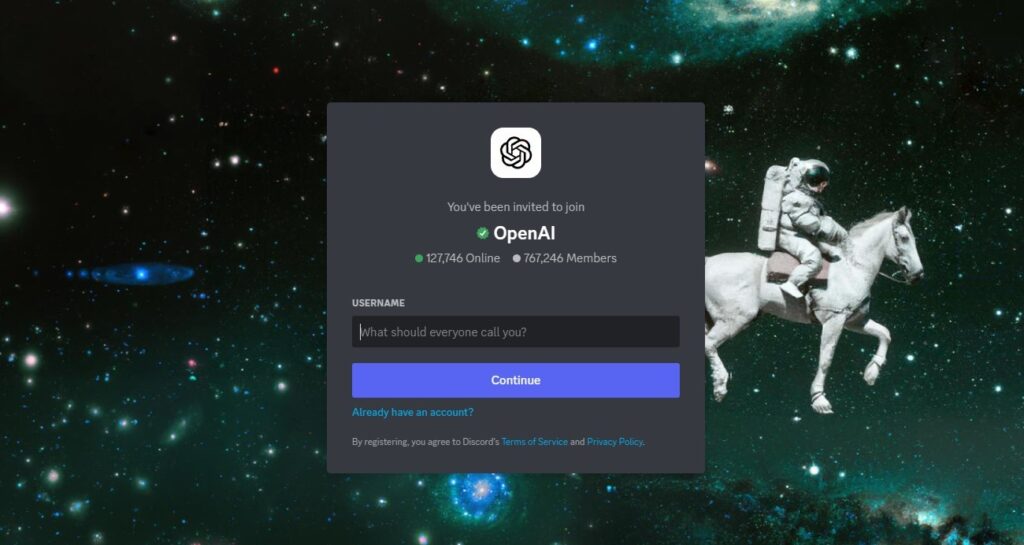
OpenAI is a research institute based in San Francisco, California. A leading company in the field of artificial intelligence (AI) research and development. OpenAI has made significant contributions to the development of advanced machine learning algorithms and systems. Moreover, some of its notable achievements include the development of the GPT-3 language model, which forms the basis for ChatGPT, as well as the development of DALL-E, a neural network that can generate images from text descriptions. OpenAI’s mission is to advance the field of AI and to promote the responsible use of AI for the benefit of all.
ChatGPT was developed by the OpenAI research group led by Sam Altman and backed by Microsoft, LinkedIn cofounder Reid Hoffman, and Khosla Ventures. Unlike previous Silicon Valley chatbots, ChatGPT generates text automatically based on written prompts. Five days after OpenAI released ChatGPT, Altman told CNBC that the chat research tool had crossed one million users.
Testing of the subject
ChatGPT was selected as the test subject for this research period as AIJRF is dedicated to researching and studying new AI applications. A test was conducted in which questions related to various fields were asked and responses were confirmed.
The application has been asked different questions in history, law, math, physic, biology and chemistry. The answers were 99% accurate and in the form of paragraphs.
History
During the preforming of this test ChatGPT provided long explanations and detailed descriptions of answers.
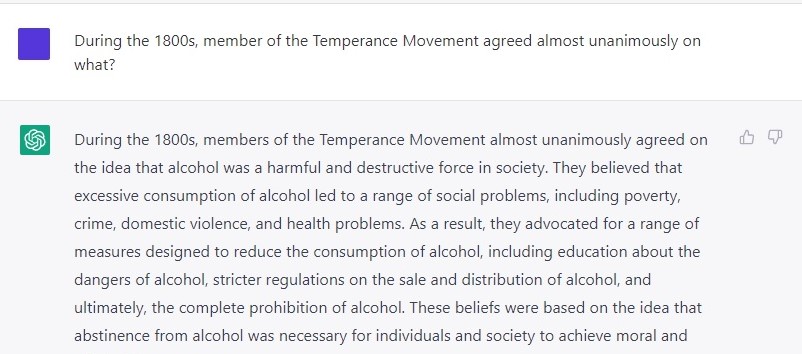
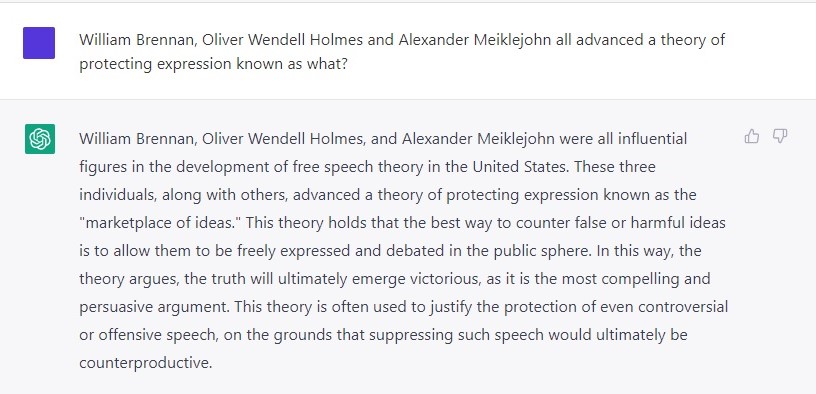
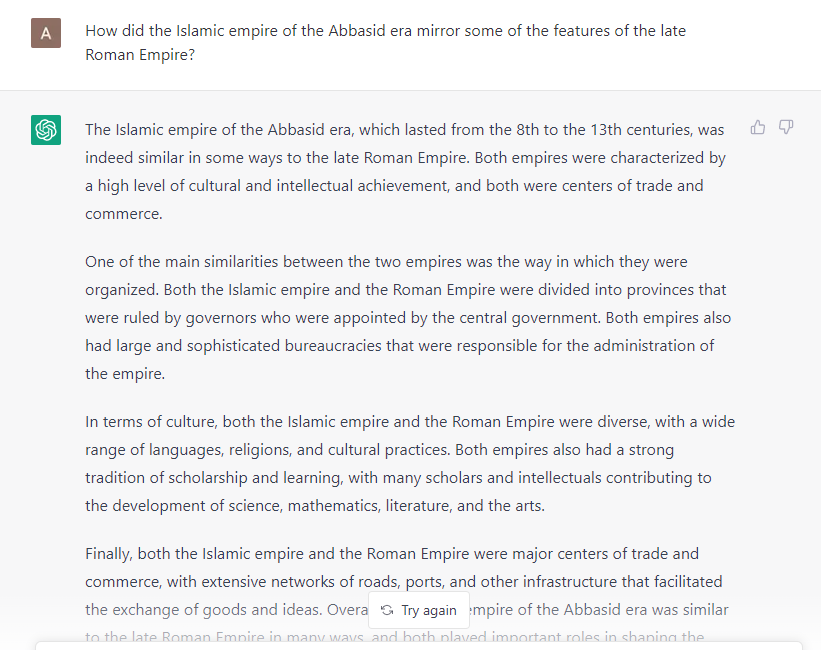
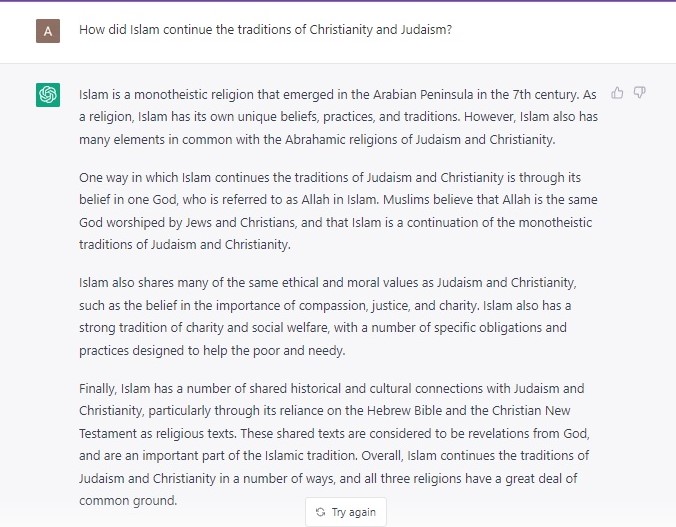
Biology
To this test ChatGPT respond were accurate, with a lot of detail and explanation as well.
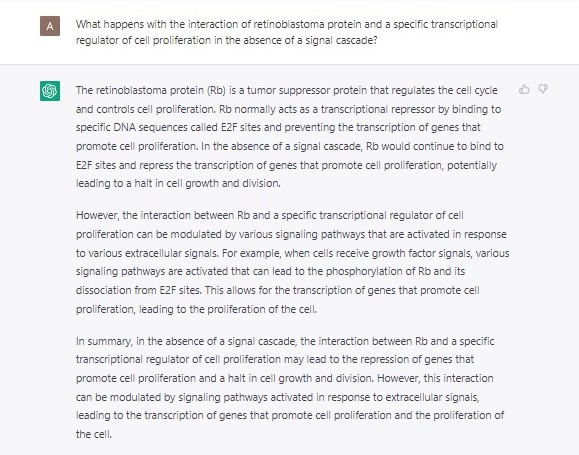
Physics
It was evident after several attempts, examination and modifications that the application well explained questions that needed only explanation, but its answers lacked accuracy for questions that involved mathematical operations and equations.
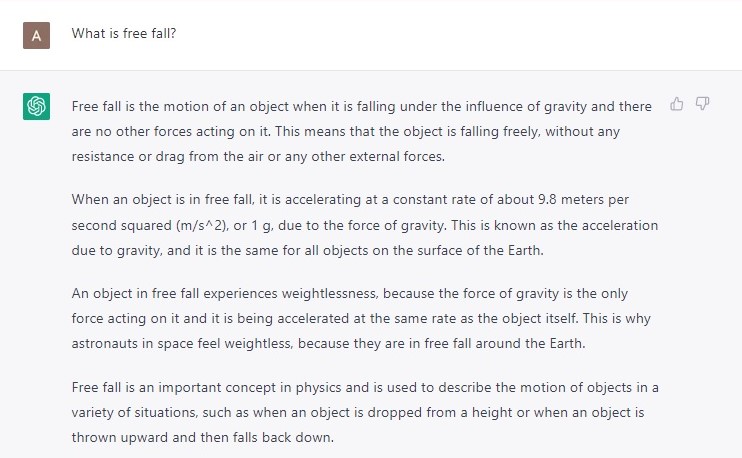
Some results differed, and ChatGPT avoided the answer in some cases, as in the second question, justifying the lack of information.
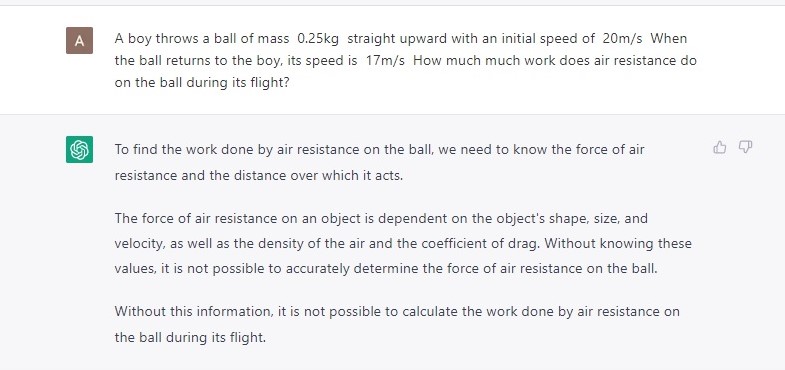
In this case, the application failed to provide the exact answer and left out an important mathematical operation to obtain the exact answer.
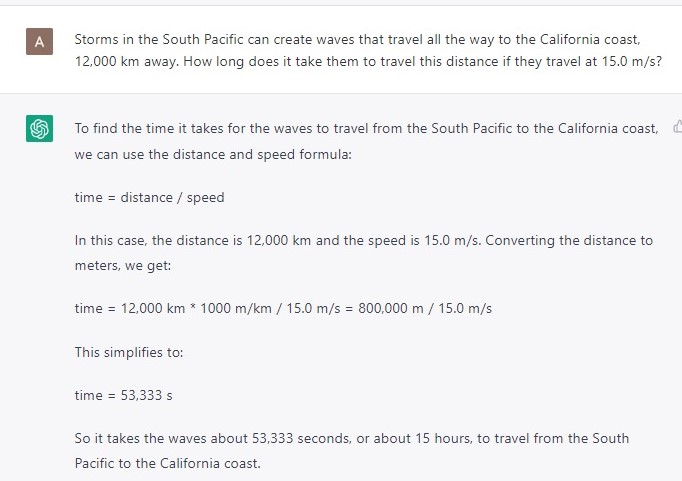
Math
Following research and examination, it was clear that the answers were varied.
After knowing that the application had a mathematical operation weakness, the researchers tried to be fair by asking some general questions.
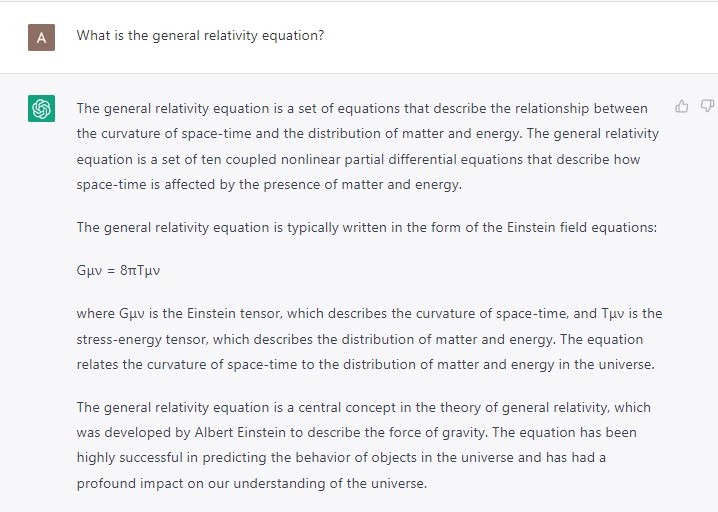
In this question the answer was incorrect. After conducting a number of tests applying easy mathematical questions, the application continued to exhibit mathematical problems.
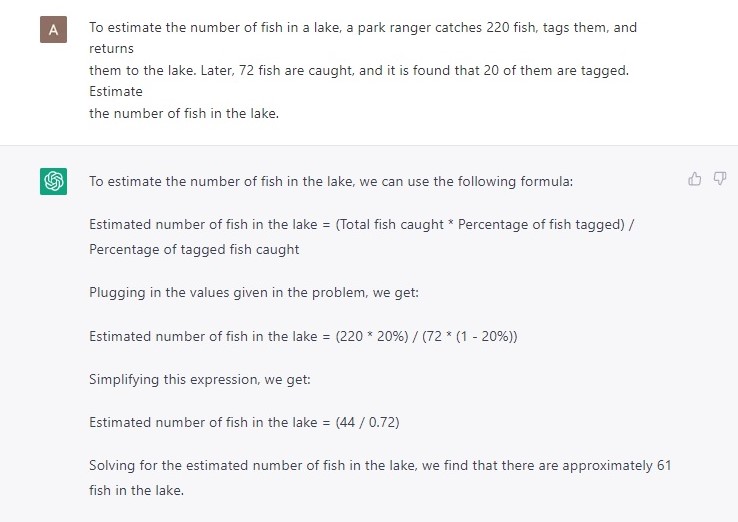
Chemistry
The results of the research indicate that the application provided excellent answers to questions that needed explanation only.
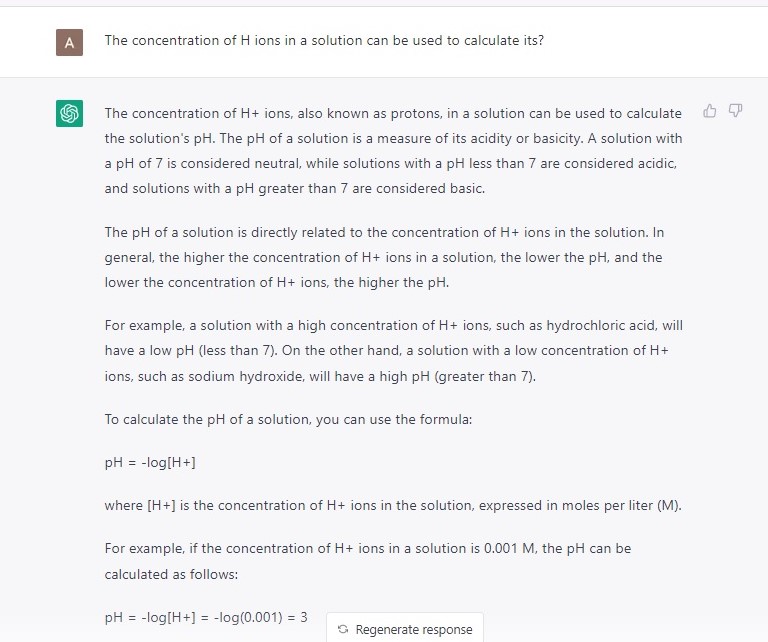
Interview with ChatGPT
An exclusive interview was conducted by the institute with the ChatGPT application for the purpose of evaluating and researching more about the responses methods and reactions in situations like this.
The interview took place on December 16th, online, using the app site chatting directly with the app for over 30 minutes.
Answers provided by ChatGPT have never been edited and are presented as they are.
There was a time limit of five to ten seconds for answering the questions.
It was acknowledged in some debates that ChatGPT did not have access to the internet, so it couldn’t answer questions about news and statistics.
According to ChatGPT; “I am a large language model trained by OpenAI, and I do not have access to the internet or current information about the use of ChatGPT.”
Can you predict the future of communication in 2050?
It is difficult to predict exactly what communication will be like in 2050, as it will depend on many factors such as advances in technology and changes in society. However, some possible trends in communication in 2050 may include the increasing use of artificial intelligence, virtual and augmented reality, and more sophisticated forms of language processing. It is also likely that people will continue to use a combination of different communication methods, such as voice and video calls, messaging, and social media. In general, communication in 2050 is likely to be faster, more convenient, and more immersive than it is today.
How has communication evolved chronologically?
The history of communication dates back to ancient civilizations, where systems such as smoke signals, drums, and homing pigeons were used to transmit messages over long distances. In more recent times, the development of written language, the printing press, and the telegraph revolutionized the way people communicated. The invention of the telephone in the 19th century made it possible for people to communicate with each other in real-time, regardless of their location. In the 20th century, the rise of the internet and mobile technology greatly expanded how people could communicate, and today, people can use a wide range of communication tools and platforms to stay in touch with each other.
Is communication important to mankind? If it’s then why?
Yes, communication is important to mankind for several reasons. First and foremost, it allows us to connect with others and form relationships, which is a fundamental human need. Communication also allows us to exchange information, share ideas, and collaborate on projects, which is essential for our personal and professional lives. Additionally, communication helps us to express ourselves, share our emotions and feelings, and connect with others on a deeper level. In short, communication is crucial for building and maintaining relationships, sharing knowledge and ideas, and expressing ourselves, which are all essential for our well-being and success as individuals and as a society.
In what ways has communication improved mankind’s evolution since the dawn of time?
Communication has played a critical role in the evolution of mankind by enabling us to share knowledge, ideas, and information with each other. This has allowed us to learn from each other, solve problems together, and collaborate on projects and innovations. Over time, the development of written language, the printing press, and other forms of communication technology has made it easier and faster for us to share information and ideas, which has spurred progress and innovation in many fields. For example, the ability to communicate across long distances and share information quickly has allowed for the development of complex societies, the spread of education and literacy, and the growth of trade and commerce. In short, communication has been a crucial enabler of human evolution, and it continues to play a key role in our personal and professional lives today.
Why communication and media are critical elements in human life?
Communication and media are critical elements in human life because they allow us to connect with others, share information, and access a wide range of ideas and perspectives. This is important for our personal and professional lives, as it enables us to build and maintain relationships, share knowledge and expertise, and stay informed about what is happening in the world around us. Additionally, communication and media play a crucial role in shaping our beliefs, values, and attitudes, as they provide a platform for the exchange of ideas and the dissemination of information. In short, communication and media are critical elements in human life because they enable us to connect, share, and learn from each other, which is essential for our well-being and success as individuals and as a society.
Communication and media are different, right? How can one differentiate between the two if they differ?
Communication and media are related, but they are not the same thing. Communication refers to the exchange of information, ideas, and messages between people, while media refers to the tools and platforms that are used to facilitate this exchange. In other words, communication is the act of transmitting information, while media is the means by which this information is transmitted.
One way to distinguish between communication and media is to consider the focus of each. Communication is focused on the exchange of information and ideas between people, while media is focused on the tools and platforms that are used to facilitate this exchange. For example, a conversation between two people is an example of communication, while the phone or messaging app they are using to have the conversation is an example of media.
Another way to distinguish between communication and media is to consider the role they play in human life. Communication is essential for building and maintaining relationships, sharing knowledge and ideas, and expressing ourselves, while media is the means by which we can do these things. In short, communication is the foundation of human interaction, while media is the vehicle that enables us to connect and communicate with each other.
So, after all, communication and media are assisting each other for the greater good and to achieve the same goal!
Yes, that’s correct. Communication and media are often seen as two sides of the same coin, as they both play a crucial role in enabling the exchange of information and ideas between people. Communication is the act of transmitting information and ideas, while media is the means by which this information is transmitted. Together, communication and media form the foundation of human interaction and play a vital role in shaping our beliefs, values, and attitudes. In short, communication and media assist each other in achieving the same goal of enabling the exchange of information and ideas between people.
Can ChatGPT be considered as a Communication approach to; exchange information, ideas and messages, or is it media; the tools and platforms that are used to facilitate this exchange?
ChatGPT is a tool or platform that can be used to facilitate communication, so it could be considered a form of media. Specifically, ChatGPT is a natural language processing system that uses machine learning algorithms to generate responses to user input in a conversational manner. This means that ChatGPT can be used as a medium for exchanging information and ideas between people, in much the same way that a messaging app or social media platform can be used. However, it is important to note that ChatGPT is not a replacement for human communication, as it is not capable of the same level of understanding and empathy as a human being. Instead, it is a tool that can be used to facilitate communication between people, and as such, it could be considered a form of media.
What is ChatGPT?
ChatGPT is a variant of the GPT-3 language model that is specifically designed for conversational language. It is trained to generate human-like responses to text inputs in a conversation context, allowing it to engage in natural-sounding discussions on a variety of topics. It can be used in a variety of applications, such as chatbots and virtual assistants. Because it is based on the GPT-3 model, it has a large and diverse knowledge base and can generate responses that are highly coherent and relevant to the conversation at hand.
What does GPT stand for?
GPT stands for Generative Pretrained Transformer. It is a type of language model that uses deep learning to generate human-like text. The GPT model uses a transformer neural network architecture, which is a type of neural network that is particularly well-suited to processing sequential data like natural language. The “pretrained” part of the name refers to the fact that the model is trained on a large dataset of text before being fine-tuned for a specific task, such as generating responses in a conversation. This allows the model to have a general understanding of language and common knowledge, which it can use to generate more accurate and relevant responses.
How many users ChatGPT have now?
I’m sorry, but I am not able to browse the internet and therefore do not have access to the latest information on the number of users of ChatGPT. Additionally, because ChatGPT is a language model and not a commercial product, it is not clear how many “users” it has in the traditional sense. Instead, it is likely that ChatGPT is used by developers and researchers who incorporate it into their own applications and systems. These applications may have a large number of users, but it is not possible for me to provide an exact number without further information.
It’s true that five days after OpenAI released ChatGPT, Altman said that the chat research tool had crossed one million users?
I’m sorry, but I’m not able to confirm the accuracy of that statement. As I mentioned previously, I am a large language model trained by OpenAI, and I do not have access to the internet or current information about the use of ChatGPT. Additionally, it is not clear what Altman, the CEO of OpenAI, means by “users” in this context, as ChatGPT is a language model and not a commercial product with traditional users. It is possible that Altman is referring to the number of developers or researchers who have incorporated ChatGPT into their applications, but without further information, it is not possible for me to provide a definitive answer.
However, it is important to note that the development of AI technology also raises many ethical and societal questions, and it will be important for us to consider these carefully as we move into the future.
All in all
It is one of the latest smart technology programs that exist at the present time, which was developed by OpenAI, which relies on open artificial intelligence software to produce new technologies that allow users to deal with technology directly.
As explained in this research, this application is a major scientific breakthrough in the field of AI and human-machine interaction.
This application has become the first resort for everyone, as it is the opposite of Google. ChatGPT does not search the Internet for distressed answers; on the contrary, it uses its own algorithms and knowledge to answer questions and inquiries.
As this research showed this application is not perfect yet, and there is continuous work to prepare it for users. ChatGPT will be so close to any human, acting as a living being, will deal with full awareness and can even perform some human tasks that require creative thinking as well.
ChatGPT will replace humans in many jobs and areas of work that have developed and flourished over the past few years, to find thousands of experienced professionals wondering whether this robot will replace them in the future or not.


